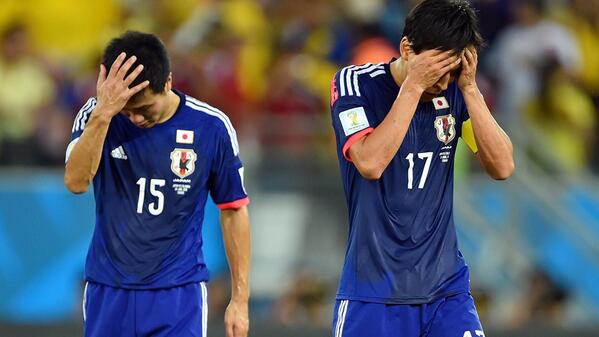After several years of hard work, grueling traveling schedules and thorough preparations, Asia produced four World Cup qualifiers – Japan, Australia, South Korea and Iran. The fact that none of these four sides picked up a victory in a combined total of 12 matches played between them highlights the decline of soccer in the region. In conjunction to this, Jordan lost their World Cup play-off decider by an aggregate score of 0-5 to Uruguay. Standards are clearly slipping.
So what exactly are the factors for this decline?
1. Lack of competition
It’s necessary to look at the level of competition these teams face. Living in China, it is easy to see why they are failing to find or produce 11 players of sufficient quality in a nation of 1 billion. There is an alarming lack of recreational facilities. The cost of renting a pitch is also sky high. Furthermore, kids spend most of their youths endlessly doing exams and trying to increase their schooling. For those who subscribe to Malcolm Gladwell’s 10,000 hours theory, these two factors greatly diminish the chances of somewhere like China, India or South Korea producing players of a sufficient standard to compete in the World Cup. Simply put, young people have nor the time, money or facilities to get to the required level.
2. Match fixing
The match fixing syndicates have badly damaged the game in Asia. Most of these shadowy figures come from places such as Macau and Singapore. Corruption is ever present in society in Asia as it is in the rest of the world and this has inevitably wormed its way into soccer in the region in the form of match fixing. Again taking China as an example, the culture of not losing “face” is prevalent. Since face has been lost, soccer has lost significant ground to other sports such as basketball.
3. Poor domestic leagues
The standards of the domestic leagues are not good enough and this is intertwined with the poor level of coaching in populous soccer crazy countries such as Thailand, Indonesia, Malaysia and Vietnam. The Middle East has some rich soccer history and has produced good players in the past. Iranian soccer suffers severely from sanctions and has resorted to playing ultra defensive soccer that will not get them very far in the long run.
Similarly in the Far East and Australia, the domestic leagues have serious problems and there is a lack of quality. Guangzhou Evergrande are the champions of Asia, but the rely mainly on a Brazilian named Elkeson to score the goals, who was nowhere near the Brazil set up even if Fred and Jo are there main strikers. In addition to this, Guangzhou coach Marcello Lippi has claimed his South Korean centre half Kim, is “good enough to play for Manchester United”. Not on the evidence of this World Cup, particularly the Algeria match. The competition is just not good enough – the reasons being outlined above.
4. Too few footballers play abroad
The U.A.E. played some outstanding football in the 2012 Olympics. However, none of these players moved on from the Middle East because the finance on offer is astronomical to the best players. Omar Abdulrahman, who was outstanding in the tournament and had trials with Man City, is still playing in the domestic league with Al Ain two years later. The foreign imports in this region are on eye-watering salaries that are killing the league. Paradoxically, the money on offer stops the best homegrown players from leaving and testing themselves elsewhere. Take Yaya Toure for example. He has played in Cote D’ Ivoire, Belgium, Ukraine, France, Spain and England. The access to so many different styles of soccer can only benefit players.
5. Android football
Which brings us to the enigma that is Japan. Japan have been the best team in Asia for some time now. They seem to have a good youth system. There is minimal match fixing (if any) and they have a soccer-hungry public. The JFA seem to be a well run organization and they have players plying their trade at several glamorous European clubs like Inter Milan, Manchester Utd and AC Milan. They also had an experienced coach in Alberto Zaccheroni. So what went wrong you say?
Well up until about 9 months ago I would not have been able to answer the question. Then one day I read that the teams from the Far East play what is termed as “android football”. I had no idea what the term was meant to denote. However, it slowly began to dawn on me, particularly after playing against several Far East Asian players in 5-a-side games, 7-a-sides and 11-asides myself. There was one week in particular when we played a Japanese team at the local park whose manager was also present. They were far better than our rag-ball team of Europeans – fitter, sharper, better technically. In the end, we only lost 4-3 when it should have been about 8-0. They played a type of soccer, “android football,” that I had never encountered before.
“Android football” features set moves from every part of the pitch for every situation – nothing was tried off the cuff. The forwards would receive the ball with their back to goal with space to turn – either to shoot or run at the defence. They would never notice this and always knock it back to the midfielder who would hit a sideways pass and we could regroup and get behind the ball. There was a distinct lack of decision-making – they were doing everything on autopilot. There was no directness. The problem with “android football” is that when something goes wrong – e.g. the opposition win the ball back where they were unexpected to do so or win the first header – it means that they are unprepared and unable to cope with this new scenario. Call it a “glitch” if you like. It is simply not possible to plan for every situation in soccer.
This is exactly what happened to Japan in the World Cup. Ivory Coast scored two identical goals within two minutes of each other. This would not happen to any other team. Against Greece, the “android football” team could not score versus 10 men, and had no plan B. Twice in two games, Japan made the same mistake defensively and the same mistake offensively by repeating unhelpful patterns. Against Colombia, they were simply blown away against a great side.
After the poor form by the Asian teams in World Cup 2014, there’s no doubt that Asian soccer has some massive challenges to tackle in the coming years to avoid the same fate at the World Cup in Russia 2018.
200+ Channels With Sports & News
- Starting price: $33/mo. for fubo Latino Package
- Watch Premier League, World Cup, Euro 2024 & more
Live & On Demand TV Streaming
- Price: $35/mo. for Sling Blue
- Watch Premier League, World Cup & MLS
Many Sports & ESPN Originals
- Price: $9.99/mo. (or get ESPN+, Hulu & Disney+ for $13.99/mo.)
- Features Bundesliga, LaLiga, Championship, & more
2,000+ soccer games per year
- Price: $4.99/mo
- Features Champions League, Serie A, Europa League & NWSL
175 Premier League Games & PL TV
- Starting price: $4.99/mo. for Peacock Premium
- Watch 175 exclusive EPL games per season
110+ channels, live & on-demand
- Price: $59.95/mo. for Plus Package
- Includes FOX, FS1, ESPN, TUDN & more























Chung
August 6, 2016 at 7:29 pm
For the schooling part where it said endless times for exam preparation that is wrong for south korea. In South Korea, if a kid wants to be a soccer player, he will have to face many hours of training. Korea is different from Europe where instead of a club soccer culture, it use to be a school system. School teams are far better than club sides and in Korea there is a difference between normal clubs and K league youths. K league youth teams opperate as school sides. For example suwon samsung youths are also known as Maetan middle school team and Maetan high school team. Ordinary clubs for example Jungrang FC send their players to school and then meet and then have training. Those guys are not affiliated with k league clubs. Korean school soccer is known for lots of training and discipline. In korea there is a problem where ordinary students study a lot but for those who want to pursue soccer they have to work hard and their training means much more than school work. Due to this those players who failed to get into university team have a very hard time because all their life they trained and didnt study. Those who went to university but failed to get into pro or semi pro face an uncertain future because for all their life they did soccer. But failed in the end. What now? This is one of the harsh realities of Korean soccer but nowadays there are efforts to change this and there are some players who are truly great because they also try to focus on academics as well. Now korean school teams train alot. But has that kind of long training been beneficial? Schools train alot but i think we have quite enough reason to think about it. Thats due to the fact that despite all the hard work, korea is not a leading nation in soccer and is quite dehind the superpowers. To be honest im not an expert and cannot give 100 percent accuracy. Son heungmins father was a footballer and also represented korea as a youth player. Heungmin was playing for a school team but his father convinced him to drop out. Why? Son heungmin stopped playing for the school and instead his father started to train him one on one. Heungmin worked his ass off. Due to all the hard work and the father wanting the best for his son eventually Son made it to Germany and played for hamburg and leverkusen and now he plays for spurs. Im not sure if i can be accurate for the entire school system of korean youth soccer but it must have been that the teaching of the coaches of sons school team was not seen as good quality by Sons father. Despite the grueling effort made by Korean youths, Korea is not a top nation and neither is Korea known for a good solid youth system. In korea the mentality is that if you are a student you only study period. If you want to become a soccer player you do only soccer period. Thus i cannot agree with the article saying stuff like not enough time due to school and stuff like that for Korea.
Taylor
July 1, 2014 at 1:13 pm
Good observation especially regarding Android football. I was surprised to see Japanese team’s performance because they have the best organization and competition.
One thing I haven’t followed anymore: is Japanese league still follows Brazilian football? I recall during the infancy, they wanted to model Brazilian football, thus inviting Brazilian players and coaches (Zico, careca, Bismarck, Jorginho, etc)?
Kei
August 7, 2016 at 11:28 am
The majority of “foreign” players in the J League are Brazilians to this day (mostly strikers and attacking mids), so there’s still a large degree of influence from that standpoint. In a convoluted way, that might explain why Japan finds it so difficult to produce a No. 9 worthy of his name…